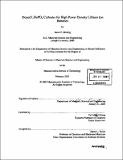Doped LiFePO₄ cathodes for high power density lithium ion batteries
Author(s)
Bloking, Jason T. (Jason Thompson), 1979-
DownloadFull printable version (2.580Mb)
Other Contributors
Massachusetts Institute of Technology. Dept. of Materials Science and Engineering.
Advisor
Yet-Ming Chiang.
Terms of use
Metadata
Show full item recordAbstract
Olivine LiFePO4 has received much attention recently as a promising storage compound for cathodes in lithium ion batteries. It has an energy density similar to that of LiCoO 2, the current industry standard for cathode materials in lithium ion batteries, but with a lower raw materials cost and an increased level of safety. An inherent limitation of LiFePO4 acknowledged by researchers studying this material is that its low intrinsic electronic conductivity limits its applicability in commercial systems. Through a doping process, however, its electrochemical performance at high current rates can be improved to levels above that of commercially available lithium batteries. The increase in performance is brought about by a concurrent increase in the electronic conductivity and a reduction of the final particle size. The experimental data suggest that cells formulated with this doped cathode material may produce power densities high enough for consideration as a future battery system for hybrid electric vehicles and other high rate applications.
Description
Thesis (S.M.)--Massachusetts Institute of Technology, Dept. of Materials Science and Engineering, 2003. Includes bibliographical references (leaves 53-56).
Date issued
2003Department
Massachusetts Institute of Technology. Department of Materials Science and EngineeringPublisher
Massachusetts Institute of Technology
Keywords
Materials Science and Engineering.